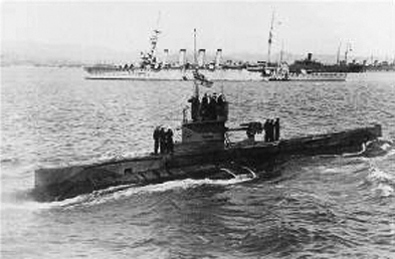Naval Operations
Winston Churchill assumed the post of First Lord of the Admiralty and political head of the Royal Navy in 1911 at the age of 37 and was regarded as a star of Asquith’s Liberal administration, having already served as Home Secretary. He had long been fascinated by Britain’s naval heritage and on appointment immediately set about mastering the intricacies of his job. In the summer of 1914 his First Sea Lord, the navy’s professional head, was Admiral Prince Louis of Battenberg. He and Churchill were responsible for ensuring that the Fleet was ready when war was declared on 4 August. Despite the services he had rendered to Fleet and nation, Battenberg was hounded from office in a wave of anti-German feeling, to be succeeded by Admiral Sir John (Jacky) Fisher who had earlier retired from this post but had remained as Churchill’s private naval adviser. Fisher and Churchill exercised a near-mesmeric attraction for each other although both possessed strong wills that frequently pulled them in opposite directions, leading eventually to Fisher’s resignation when he realised he could not alter his political master’s obsession with the Gallipoli and Dardanelles campaigns.
 Photograph: HM Submarine E 11.
Photograph: HM Submarine E 11.
The Anglo-French blockade of the Dardanelles was helped by the readiness of the Greek Prime minister, Venizelos, to permit the use of a number of Greek offshore islands as forward bases. (Whilst Venizelos, a fiercely nationalistic Greek enmeshed in the Pan-Hellenic movement, supported the western allies and earlier offered them the services of several divisions to land in Turkish Thrace. However,the King of the Hellenes, who was married to the Kaiser's sister, vetoed this move and pursued a neutral policy although strongly inclined towards the Central Powers) The islands included the superb natural harbour of Mudros Bay on Lemnos and the islands of Tenedos, Imbros and Mytilene (Lesbos). The allied fleet was commanded by the British Vice Admiral Carden. Its capital ships were all of pre-dreadnought vintage, Fisher having vetoed the deployment of modern battleships to the eastern Mediterranean. Until the end of the year the blockade was carried out effectively and on 13 December a British submarine, the B 11, penetrated several lines of floating mines and torpedoed the elderly Turkish battleship Messudieh, moored as guardship off Chanak, a deed which gained for Lt Commander Holbrook its commander the Navy's first Submariners' VC. However, developments were at hand that would radically alter the tempo of operations.
